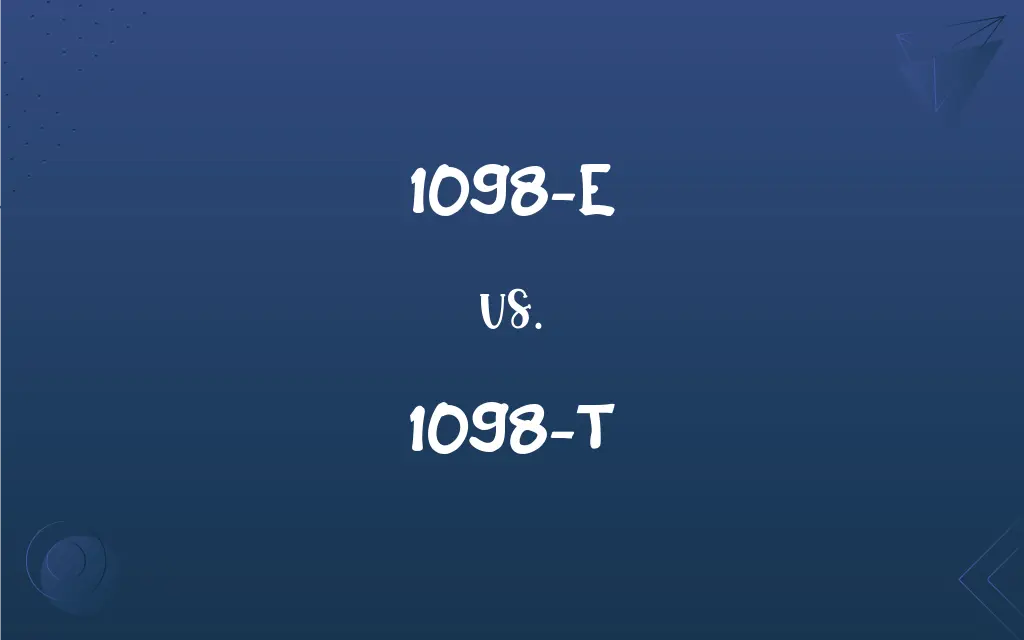1098-E vs. 1098-T: What's the Difference?
Edited by Janet White || By Harlon Moss || Updated on October 10, 2023
1098-E refers to the Student Loan Interest Statement. 1098-T pertains to the Tuition Statement for educational expenses.

Key Differences
The 1098-E is an official tax form that reports the amount of interest that borrowers have paid on their student loans throughout the year. Conversely, the 1098-T is a form provided by educational institutions to students, outlining the amount of qualified educational expenses they've paid.
For those who pay interest on student loans, the 1098-E form serves as an essential document to determine if they're eligible for tax deductions. On the other hand, the 1098-T assists students (or their guardians) in figuring out if they qualify for certain educational tax credits or deductions.
It's crucial to understand that the 1098-E is strictly related to student loan interest and doesn't cover principal amounts. However, the 1098-T touches on tuition and related expenses, allowing taxpayers to potentially claim educational benefits.
Every lender that receives interest payments of $600 or more during a calendar year must provide borrowers with the 1098-E. In comparison, educational institutions send the 1098-T to every eligible student, irrespective of the tuition amount.
The IRS receives copies of both the 1098-E and 1098-T, ensuring that taxpayers report the correct amounts on their tax returns. Thus, both these forms play pivotal roles in the financial lives of students and graduates.
ADVERTISEMENT
Comparison Chart
Purpose
Reports student loan interest
Reports tuition and fees
Issued By
Student loan lenders
Educational institutions
Tax Implication
Possible interest deduction
Possible education credits
Monetary Threshold
Usually $600 interest or more
No minimum, varies by institution
Main Beneficiaries
Student loan borrowers
Students or their guardians
ADVERTISEMENT
1098-E and 1098-T Definitions
1098-E
1098-E is the Student Loan Interest Statement.
I received my 1098-E and saw how much interest I paid last year.
1098-T
1098-T is the Tuition Statement provided by educational institutions.
The university sent me a 1098-T outlining my tuition payments.
1098-E
1098-E assists in determining tax deductibility of student loan interest.
With my 1098-E, I realized I could deduct some of the interest.
1098-T
1098-T is given to students or their guardians to report educational costs.
My parents needed my 1098-T for their tax filing.
1098-E
1098-E reports interest paid on student loans.
Using my 1098-E, I calculated potential tax deductions.
1098-T
1098-T assists taxpayers in claiming educational benefits.
The information on my 1098-T helped me get a tuition deduction.
1098-E
1098-E is issued by student loan lenders.
My loan provider sent me the 1098-E in January.
1098-T
1098-T outlines qualified educational expenses.
Using the 1098-T, I was able to apply for an education credit.
1098-E
1098-E is essential for accurate tax filings related to student loan interest.
Ensure you have your 1098-E ready before filing your taxes.
1098-T
1098-T is critical for determining educational tax benefits.
My accountant requested my 1098-T for tax calculations.
FAQs
What is the 1098-E used for?
The 1098-E reports the amount of interest paid on student loans throughout the year.
What does the 1098-T show?
The 1098-T outlines qualified educational expenses paid by a student.
Can I get a tax deduction using 1098-E?
Yes, the 1098-E can help you determine eligibility for student loan interest deductions.
Can I file taxes without the 1098-E?
Yes, but having the 1098-E ensures accuracy in reporting student loan interest.
Who issues the 1098-T?
The 1098-T is issued by educational institutions.
Is the 1098-T only for tuition?
No, the 1098-T can also include other qualified educational expenses.
How often will I receive a 1098-E?
You'll receive the 1098-E annually if you've paid $600 or more in student loan interest.
How do I get my 1098-T if I lost it?
You can request a duplicate from your educational institution or access it via the institution's online portal.
Is the 1098-T only for U.S. citizens?
No, the 1098-T is issued to all eligible students, regardless of citizenship, attending U.S. institutions.
What should I do with my 1098-E?
Keep your 1098-E for tax filing purposes to determine potential interest deductions.
Can the 1098-T be used for tax credits?
Yes, the 1098-T can help determine eligibility for certain educational tax credits.
Does the IRS receive a copy of my 1098-E?
Yes, lenders send a copy of the 1098-E to the IRS.
Who benefits most from the 1098-E?
Student loan borrowers who've paid significant loan interest benefit from the 1098-E for potential tax deductions.
What if I refinance my student loan, do I still get a 1098-E?
Yes, as long as you've paid qualifying interest on the refinanced loan, you'll receive a 1098-E.
Can I use the 1098-T for previous years' tax filings?
No, the 1098-T should be used for the tax year it corresponds to. Ensure you have the correct year's form when filing.
If I didn't receive a 1098-E, did I not pay interest?
Not necessarily. Lenders typically issue a 1098-E for interest payments of $600 or more, but you may have paid less than that.
What if the information on my 1098-T seems incorrect?
Contact your educational institution's financial or registrar's office for clarification or corrections.
Do I need the 1098-T if I'm not claiming any educational benefits?
While not mandatory, it's advisable to keep the 1098-T for records and potential future use.
Do private student loan lenders also issue 1098-E?
Yes, both federal and private student loan lenders issue the 1098-E if you've paid qualifying interest.
Do I always get a 1098-T from my school?
Most educational institutions provide a 1098-T annually to eligible students, regardless of the tuition amount.
About Author
Written by
Harlon MossHarlon is a seasoned quality moderator and accomplished content writer for Difference Wiki. An alumnus of the prestigious University of California, he earned his degree in Computer Science. Leveraging his academic background, Harlon brings a meticulous and informed perspective to his work, ensuring content accuracy and excellence.
Edited by
Janet WhiteJanet White has been an esteemed writer and blogger for Difference Wiki. Holding a Master's degree in Science and Medical Journalism from the prestigious Boston University, she has consistently demonstrated her expertise and passion for her field. When she's not immersed in her work, Janet relishes her time exercising, delving into a good book, and cherishing moments with friends and family.































































